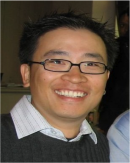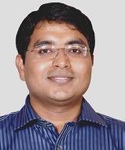Panel
When Search is Not Solitary: Perspectives on Social and Collaborative Search
In recent years, search has become a multi-person endeavor: recommender systems, social search, click-based implicit relevance feedback, collaborative search are just some of the buzzwords we've all become familiar with. But are these terms different manifestations of the same concept or are there fundamental differences that underlie them? In this panel we'll explore the pros and cons of various approaches. We'll take a collaborative approach to social search, or, perhaps, vice versa.
Chair: Jeremy Pickens
Panelists
Dr. Ed Chi, Google

Ed H. Chi is a Research Scientist at Google, embedded in the Google+ project. Until very recently, he was the Area Manager and a Principal Scientist at Palo Alto Research Center'sAugmented Social Cognition Group. He led the group in understanding how Web2.0 and Social Computing systems help groups of people to remember, think and reason. Ed completed his three degrees (B.S., M.S., and Ph.D.) in 6.5 years from University of Minnesota, and has published 20 patents and over 90 research articles. He has been featured and quoted in the press, including the Economist, Time Magazine, LA Times, and the Associated Press. Having done research on user interface software systems since 1993, his most well-known past project is the study of Information Scent --- understanding how users navigate and understand the Web and information environments. He also led a group of researchers at PARC to understand the underlying mechanisms in online social systems such as social networks, Wikipedia and social tagging sites. He has also worked on information visualization, computational molecular biology, ubicomp, and recommendation/search engines, and has won awards for both teaching and research. In his spare time, Ed is an avid Taekwondo martial artist, photographer, and snowboarder.
Dr. Gene Golovchinsky, FX Palo Alto Research Lab, Inc.

Gene Golovchinsky is a Sr. Research Scientist at FX Palo Alto Laboratory. His research interests include interaction design for information seeking, Human-Computer Information Retrieval (HCIR), collaborative search, dynamic hypertext, and pen-based computing. Gene received a PhD and a MASc in Human Factors from the University of Toronto, and a BS in Electrical Engineering from UCLA. Gene is a Senior Member of the ACM.
Dr. Meredith Ringel Morris, Microsoft Research

Meredith Ringel Morris is a research scientist in the Adaptive Systems & Interaction group at Microsoft Research. She is also an affiliate assistant professor of Computer Science & Engineering at the University of Washington. Dr. Morris’s research area is human-computer interaction, with a particular emphasis on computer-supported cooperative work and social computing. She has published numerous technical articles and patents on multi-user interactive systems, and recently co-authored the book Collaborative Web Search: Who, What, Where, When, and Why? (Morgan & Claypool, 2010). Dr. Morris served as the co-chair of the technical program for CHI 2009, the ACM’s premier conference on the topic of human-computer interaction. She was named one of 2008’s 35 Innovators Under 35 by Technology Review, and one of 2009’s 100 Notable Women in Seattle Technology by TechFlash. Dr. Morris earned a Ph.D. and M.S. in computer science from Stanford University, and an Sc.B. in computer science from Brown University.
Dr. Krishna Gummadi, Max Planck Institute for Software Systems

Krishna Gummadi leads the Networked Systems research group at the Max Planck Institute for Software Systems (MPI-SWS) in Germany. He received his Ph.D. (2005) and M.S. (2002) degrees in Computer Science and Engineering from the University of Washington, Seattle.
Krishna's research interests are in the measurement, analysis, design, and evaluation of complex Internet-scale systems. His current projects focus on enabling the social Web. Specifically, they include (a) understanding the structure and evolution of social network graphs, (b) understanding how content and information propagates through social networks, (c) leveraging social networks for building better information sharing systems (i.e., better search results and content recommendations as well as filtering unwanted communication and content), and (d) building scalable infrastructures for supporting social networking sites and their workloads.
Krishna's work on online social networks, Internet access networks, and peer-to-peer systems has led to a number of widely cited papers. He also received best paper awards at OSDI, SIGCOMM IMW, and MMCN for his work on Internet measurements and peer-to-peer systems.
















